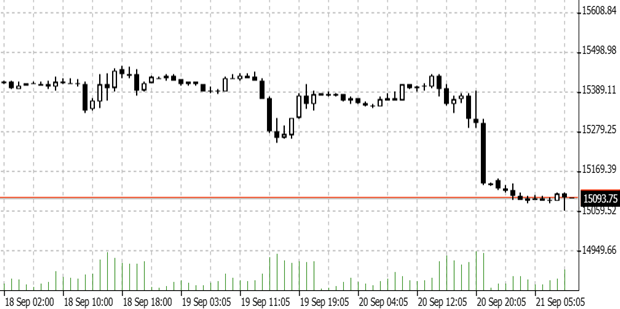

21.09.2023 – The Federal Reserve did pause on interest rates, as expected. However, Fed Chairman Jerome Powell’s announcement was unexpectedly hawkish. Perhaps interest rates will remain at the elevated level for quite some time. Or for all time, as the “Wall Street Journal” rumored.
The reaction of the Nasdaq 100 is quite clear – after the interest rate decision, it went downhill for the time being. Here is the hourly chart.

Source: Bernstein Bank GmbH
This is what happened: Yesterday, the U.S. Federal Reserve left key interest rates at the 5.25 to 5.5 percent level. The interest rate pause was largely expected – because the Fed is in a dilemma: Economic growth recently proved to be stronger than the central bankers had expected and predicted. But the same is true of stubborn core inflation, which was 4.2 percent in July and just under 4 percent for the year to date. The Fed’s monetary policy target is only 2 percent inflation.
Interest rate forecast raised
However, there are certainly indications for the market: In its current forecast – these are the much-cited dot plots in the real-time news – the Fed expects an average key interest rate of 5.6 percent at the end of the year. For 2024, an average of 5.1 percent is expected – in June, it had been 4.6 percent.
Nothing is forever
Bloomberg commented that the Fed had hinted at significantly higher interest rates in 2024 and 2025. As is so often the case, the Wall Street Journal summed up the mood in the financial market most succinctly and quite pointedly: “Higher Rates Not Just for Longer, but Maybe Forever. According to this, the Fed could consider a higher neutral interest rate than before to be appropriate, i.e. the interest rate at which inflation on the one hand and unemployment and economic output on the other are in a stable equilibrium.
Our conclusion: The “always” is, of course, just a linguistic trick to secure the readers’ attention – nothing lasts forever. After all, even sustained high oil prices could stall economies worldwide and push interest rates back down – so keep an eye on the big picture. Bernstein Bank wishes successful trades and investments!
________________________________________________________________________________________________________________________________________
The content of this publication is for general information purposes only. In this context, it is neither an individual investment recommendation or advice nor an offer to purchase or sell securities or other financial products. The content in question and all the information contained therein do not in any way replace individual investor- or investment-oriented advice. No reliable forecast or indication for the future is possible with respect to any presentation or information on the present or past performance of the relevant underlying assets. All information and data presented in this publication are based on reliable sources. However, Bernstein Bank does not guarantee that the information and data contained in this publication is up-to-date, correct and complete. Securities traded on the financial markets are subject to price fluctuations. A contract for difference (CFD) is also a financial instrument with leverage effect. Against this backdrop, CFD trading involves a high risk up to the point of total loss and may not be suitable for all investors. Therefore, make sure that you have fully understood all the correlating risks. If necessary, ask for independent advice. CFDs are complex instruments and are associated with the high risk of losing money quickly because of the leverage effect. 68% of retail investor accounts lose money trading CFD with this provider. You should consider whether you understand how CFD work and whether you can afford to take the high risk of losing your money.7
